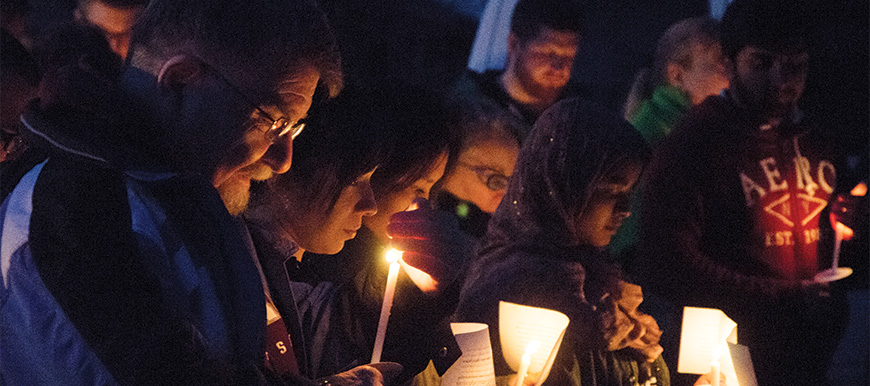Candlelight vigil honors Muslim shooting victims
A small crowd of people, illuminated by candlelight, stood in the cold behind the Logan Islamic Center for an hour as representatives from religion after religion addressed the shootings of three Muslim students in North Carolina last week.
After an opening prayer, a representative from the Islamic faith spoke about the shootings, then someone from the Episcopalian church, then Presbyterian, Quaker, Lutheran, Mormon, Buddhist and Catholic all spoke about unity and trying times.
“It’s my honor to stand together with all of you and with our brothers and sisters who follow the path of Islam,” said Paul Hines, a representative of the First Presbyterian Church in Logan. “In my tradition there is a verse that encourages us to rejoice with those who rejoice and to weep with those who weep. Tonight we weep together.”
Quickly after news of the shootings came, the Logan Islamic Center started setting up the vigil.
“We specifically went around and invited every religious organization in the valley. We spent last Friday running around and doing that,” said Erik Thalman, a member of the Logan Islamic Center who helped organize the event.
The idea was to unite as many religions as possible both against hate crimes of religion and in remembrance of the three Muslims who were shot and killed.
“These are times of great darkness and times of violence and times of bloodshed all over the world, not just in North Carolina,” said Aiya Sakr, one of the organizers of the event, to the crowd. “It is because of that, although it might be scary, that we must stand together united and to send a different kind of message a message of peace, hope and understanding.”
Deah Barakat, 23, Yusor Mohammed Abu-Salhad, 21, and Razan Mohammed Abu-Salhad, 19, were all shot and killed by Craig Stephen Hicks in North Carolina. There is some dispute over the motive for the shooting with Hicks and police. Some say it was over a parking dispute, while other critics claim it was a hate crime.
Barakat was a student at the University of North Carolina. His wife, Yusor, was a graduate of North Carolina State University who was planning on attending UNC in the fall. Razan was Yusor’s little sister and a student at N.C. State.
Mohammed Hussein, coordinator of religious affairs at the Logan Islamic Center, said that Yusor and Razan’s father, Mohammed Abu-Salhad, is a Palestinian man who came to America seeking safety.
“He left his land. He left his people, and he came here seeking safety,” Hussein said to the attendees. “He became an American citizen, and he had two daughters. They spoke accent-free American English. They went to American universities they became good American citizens. But it was not enough for them.”
For some members of the Muslim community like Omima Khalat, who is a Muslim student at Utah State, the events in North Carolina are concerning from a personal perspective.
“This story has touched our hearts a lot because this could be us,” Khalat said. “These people were like normal people. They were even American. Like, they play basketball. They were born here, raised here. This simply could be any one of us.”
Bonnie Glass-Coffin, the leader of the interfaith initiative at USU, said that the multiple religions coming together was important.
“I thought it was fantastic for a very sad reason. It was fantastic that we all came together,” said Glass-Coffin. “That’s really the point of the whole Utah State University interfaith initiative, to be able to come together around common concerns.”
The Islamic Center also took the opportunity to educate people about their faith.
“What would really help is the changing of our understanding, changing of our concepts, changing of the way we look at others. (Understanding) that we are humankind,” Hussein said.
They also took the opportunity to send their own message.
“We’re not afraid, and we want to just include everyone. Extreme voices are really loud, and we just want to show a different kind of voice, so we just figured bring a lot of quiet voices together and maybe they can all speak as one,” Sakr and Khalat said.
— dahdahjm@gmail.com

